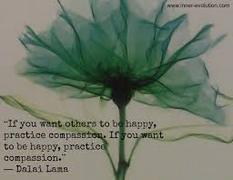The response of many people to societal demands to be "confident," is to rush around doing constructive, visible things that can give us a sense that we have done what a "confident" person would, or that we've been noticed by others and praised, or that we can compare ourselves to others and feel somehow better than they are. This temporary ego inflation may make us feel good for a while, but it doesn't last. We end up in a cycle of ups and downs that is not only exhausting, but emotionally damaging as well. Ultimately it makes us fundamentally unhappy.
One result of this damaging cycle are the innumerable clients who believe that they are "not good enough."

Undeserving -
Worthless:"
Have you ever thought this about yourself? It's a common and tragic experience for many people in contemporary society, caused in part by a simple desire to feel exactly the opposite.
Kristin Neff has contemplated this very dilemma for her entire career, and has come up with the simple and practical concept of self compassion.
At the basis of Neff's research into self-compassion was the need to arrive at a definition of self confidence that wasn't laced with the narcissistic or self-defeating notions so common with many understandings of self confidence. She arrived at a definition where self-compassion is self-kindness with no association with narcissism, “a self-determined way of evaluating oneself that is not dependent on particular outcomes, social approval, or feeling superior to others, and is founded on a stable and non-contingent self-evaluation.” (Neff, 2011, p. 9)
What does that really mean?
Well, for me as a therapist, there is recognition that the underlying point of therapy is joy, and that there are actual ways and means to assist people to attain it.
For clients, using self-kindness, a sense of shared humanity, and mindfullness of one's self, can provide a way forward to experience a calmness and self acceptance that has not often been known. It can generate a new experience of self, filled with life-force: stability and strength, optimism and joy. It can successfully help to counter-balance feelings of self-criticism, depression, anxiety, and perfectionism. Self-kindness and self-compassion are vital components of the therapy I offer, and the profound impact it has on individuals is positive and encouraging.
Self compassion provides an opportunity to experience the positives of self-esteem, without the negative aspects of narcissism, judgement, negative comparisons, and inner self-worth dialogues. It can change your life.
You can have a look at how your personal self-compassion rates at this simple online test created by Kristin Neff. I've also included a video below of Kristin Neff explaining her theory in an excellent TED talk.
Is self-criticism a habit you're familiar with? Is self-compassion a useful concept for you? How do you practice self-kindness in your life? Share your comments below.
References:
- Neff, K. (2011) Self-Compassion, Self-esteem, and Well-Being. Social and Personality Psychology Compass. Blackwell Publishing.
- Neff, K., Rude, S., Kirkpatrick, K. (2006) An examination of self-compassion in relation to positive psychological functioning and personality traits. Journal of Research in Personality, Elsevier, from Science Direct.


 RSS Feed
RSS Feed